Myonuclei acquired by overload exercise precede hypertrophy and are not lost on detraining
- PMID: 20713720
- PMCID: PMC2930527
- DOI: 10.1073/pnas.0913935107
Myonuclei acquired by overload exercise precede hypertrophy and are not lost on detraining
Abstract
Effects of previous strength training can be long-lived, even after prolonged subsequent inactivity, and retraining is facilitated by a previous training episode. Traditionally, such "muscle memory" has been attributed to neural factors in the absence of any identified local memory mechanism in the muscle tissue. We have used in vivo imaging techniques to study live myonuclei belonging to distinct muscle fibers and observe that new myonuclei are added before any major increase in size during overload. The old and newly acquired nuclei are retained during severe atrophy caused by subsequent denervation lasting for a considerable period of the animal's lifespan. The myonuclei seem to be protected from the high apoptotic activity found in inactive muscle tissue. A hypertrophy episode leading to a lasting elevated number of myonuclei retarded disuse atrophy, and the nuclei could serve as a cell biological substrate for such memory. Because the ability to create myonuclei is impaired in the elderly, individuals may benefit from strength training at an early age, and because anabolic steroids facilitate more myonuclei, nuclear permanency may also have implications for exclusion periods after a doping offense.
Conflict of interest statement
The authors declare no conflict of interest.
Figures
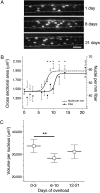
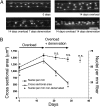
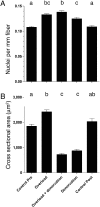
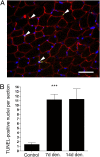
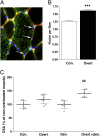

Comment in
-
Commentaries on Viewpoint: "Muscle memory" not mediated by myonuclear number? Secondary analysis of human detraining data.J Appl Physiol (1985). 2019 Dec 1;127(6):1817-1820. doi: 10.1152/japplphysiol.00754.2019. J Appl Physiol (1985). 2019. PMID: 31829831 Free PMC article. No abstract available.
References
-
- Staron RS, et al. Strength and skeletal muscle adaptations in heavy-resistance-trained women after detraining and retraining. J Appl Physiol. 1991;70:631–640. - PubMed
-
- Taaffe DR, Marcus R. Dynamic muscle strength alterations to detraining and retraining in elderly men. Clin Physiol. 1997;17:311–324. - PubMed
-
- Rutherford OM, Jones DA. The role of learning and coordination in strength training. Eur J Appl Physiol Occup Physiol. 1986;55:100–105. - PubMed
-
- MacDougall JD, Elder GC, Sale DG, Moroz JR, Sutton JR. Effects of strength training and immobilization on human muscle fibres. Eur J Appl Physiol Occup Physiol. 1980;43:25–34. - PubMed
-
- Houston ME, Froese EA, Valeriote SP, Green HJ, Ranney DA. Muscle performance, morphology and metabolic capacity during strength training and detraining: A one leg model. Eur J Appl Physiol Occup Physiol. 1983;51:25–35. - PubMed
Publication types
MeSH terms
LinkOut - more resources
Full Text Sources

